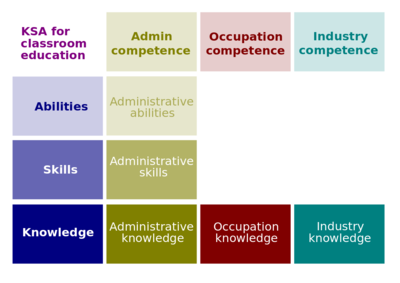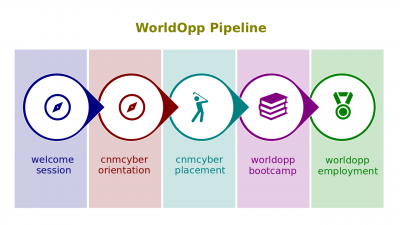Difference between revisions of "Academic Credentials"
(Created page with "Academic Credentials (hereinafter, the ''Lectio'') is the second lesson part of the '''Employee Competences''' lesson that introduces its participants t...") |
|||
| (34 intermediate revisions by 2 users not shown) | |||
| Line 1: | Line 1: | ||
| − | [[Academic Credentials]] (hereinafter, the ''Lectio'') is the second [[lectio|lesson part]] of the '''[[ | + | [[Academic Credentials]] (hereinafter, the ''Lectio'') is the second [[lectio|lesson part]] of the '''[[Certifications of Study]]''' [[lesson]] that introduces its participants to [[educational credential]]s and related topics. |
| − | [[File:Educaship-pipeline.png|400px|thumb|[[WorldOpp Pipeline]]]]This ''lesson'' belongs to the [[Introduction to Education]] session of | + | [[File:Educaship-pipeline.png|400px|thumb|[[WorldOpp Pipeline]]]]This ''lesson'' belongs to the [[Introduction to Education]] session of [[EmployableU Concepts]]. |
==Content== | ==Content== | ||
| − | The predecessor [[lectio]] is [[ | + | The predecessor [[lectio]] is [[Educational Credentials]]. |
| − | + | [[File:Masters-degree-ksa.png|400px|thumb|[[KSA]] that classroom-based education targets]] | |
| − | |||
| − | |||
===Script=== | ===Script=== | ||
| − | : | + | :An [[academic credential]] is an [[educational credential]] that is issued by an [[educational institution]] or [[credentialing body]] to certify specific academic achievements traditionally related to someone's knowledge. |
| + | |||
| + | :[[Diploma]]s such as [[high school diploma]]s or [[GED]] ([[General Equivalency Diploma]]) commonly testify that the recipient has achieved specified objectives of a particular [[course of study]]. | ||
| + | |||
| + | :[[Tertiary school]]s such as [[college]]s and [[university|universiti]]es issue [[undergraduate degree|undergraduate]] and [[graduate degree]]s. | ||
| + | |||
| + | :''Undergraduate credentials'' include [[associate degree]]s, which ''course of study'' intends to last about two years, and [[Bachelor's degree]]s, which ''courses of study'' may last from three and up to seven years depending on institution and academic discipline. ''Undergraduate'' programs are overwhelmingly built on [[learning content delivery]]. | ||
| + | |||
| + | :''Graduate credentials'' include [[Master's degree]]s and [[PhD]] ([[Doctor of Philosophy]]) or similar highest, terminal degrees. ''Graduate'' programs are designed to last from one to four years beyond the coursework required by a [[Bachelor's degree]]. Both types of these ''credentials'' require independent research. The requirements to earn a [[PhD]] regularly include comprehensive examinations and work on thesis or dissertation based on extensive research. | ||
| + | :There are two more opposite trends that are worthy to be mentioned. | ||
| + | |||
| + | :On one hand, [[credentialism]] or [[academic inflation]] refers to the tendency of the devaluation of educational qualifications because of the needs of [[educational institution]]s to increase revenues and cut expenses, on one side, and increasing demands, on the other side. This process further provokes [[credential creep]]. | ||
| + | |||
| + | :On another hand, a few [[occupation]]s don't require academic achievements. All in all, the probability that you will ever meet any [[recruiter]] who has earned the degree in Recruitment is obsolete. | ||
| + | |||
| + | ===Key terms=== | ||
| + | :[[Academic credential]], [[diploma]], [[associate degree]], [[Bachelor's degree]], [[Master's degree]], [[PhD]] ([[Doctor of Philosophy]], [[PhD degree]]), [[professional degree]], [[credentialism]] ([[academic inflation]]) | ||
| + | |||
| + | ===Closing=== | ||
| + | :Is the [[concept]] of [[credentialism]] explained well? --Yes/No/I'm not sure | ||
| + | |||
'''[[Educational Institutions]]''' is the successor [[lectio]]. | '''[[Educational Institutions]]''' is the successor [[lectio]]. | ||
| − | == | + | ==Questions== |
| + | |||
| + | ===Placement entrance exam=== | ||
Latest revision as of 20:50, 29 October 2023
Academic Credentials (hereinafter, the Lectio) is the second lesson part of the Certifications of Study lesson that introduces its participants to educational credentials and related topics.
This lesson belongs to the Introduction to Education session of EmployableU Concepts.
Content
The predecessor lectio is Educational Credentials.

KSA that classroom-based education targets
Script
- An academic credential is an educational credential that is issued by an educational institution or credentialing body to certify specific academic achievements traditionally related to someone's knowledge.
- Diplomas such as high school diplomas or GED (General Equivalency Diploma) commonly testify that the recipient has achieved specified objectives of a particular course of study.
- Tertiary schools such as colleges and universities issue undergraduate and graduate degrees.
- Undergraduate credentials include associate degrees, which course of study intends to last about two years, and Bachelor's degrees, which courses of study may last from three and up to seven years depending on institution and academic discipline. Undergraduate programs are overwhelmingly built on learning content delivery.
- Graduate credentials include Master's degrees and PhD (Doctor of Philosophy) or similar highest, terminal degrees. Graduate programs are designed to last from one to four years beyond the coursework required by a Bachelor's degree. Both types of these credentials require independent research. The requirements to earn a PhD regularly include comprehensive examinations and work on thesis or dissertation based on extensive research.
- There are two more opposite trends that are worthy to be mentioned.
- On one hand, credentialism or academic inflation refers to the tendency of the devaluation of educational qualifications because of the needs of educational institutions to increase revenues and cut expenses, on one side, and increasing demands, on the other side. This process further provokes credential creep.
- On another hand, a few occupations don't require academic achievements. All in all, the probability that you will ever meet any recruiter who has earned the degree in Recruitment is obsolete.
Key terms
- Academic credential, diploma, associate degree, Bachelor's degree, Master's degree, PhD (Doctor of Philosophy, PhD degree), professional degree, credentialism (academic inflation)
Closing
- Is the concept of credentialism explained well? --Yes/No/I'm not sure
Educational Institutions is the successor lectio.
